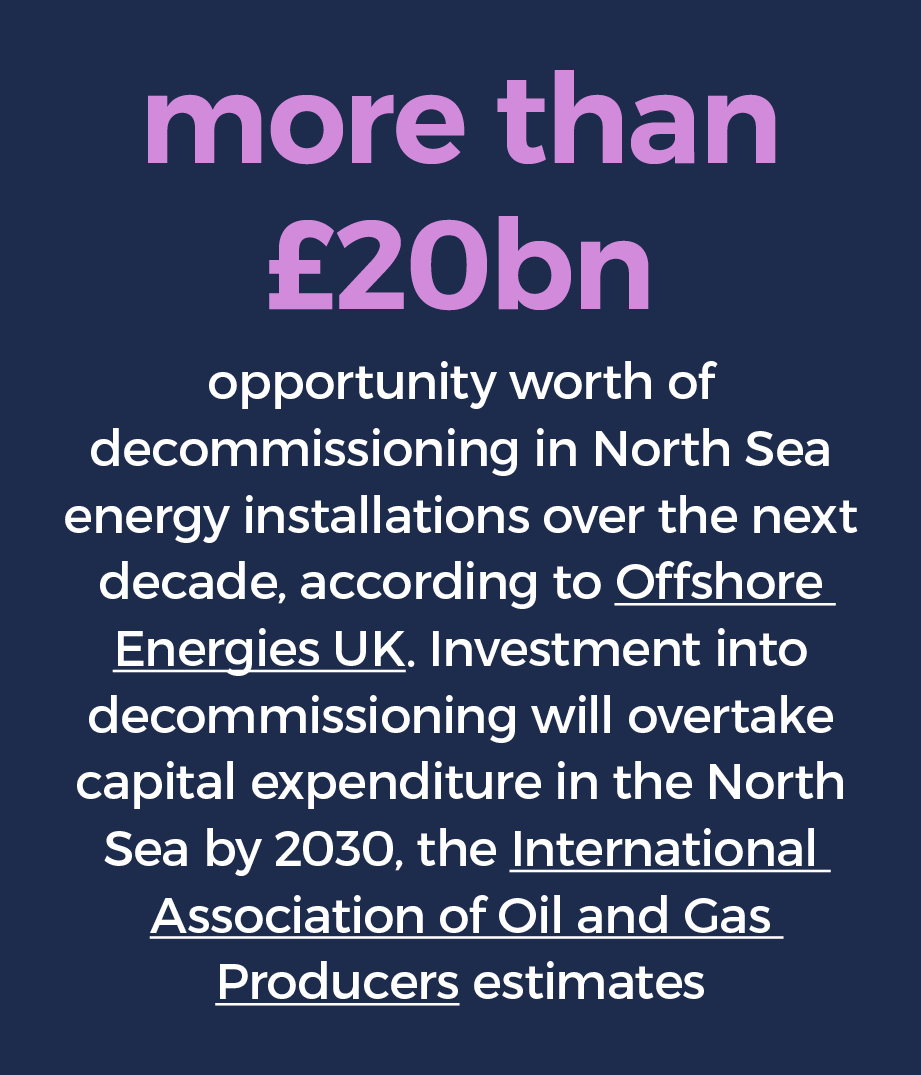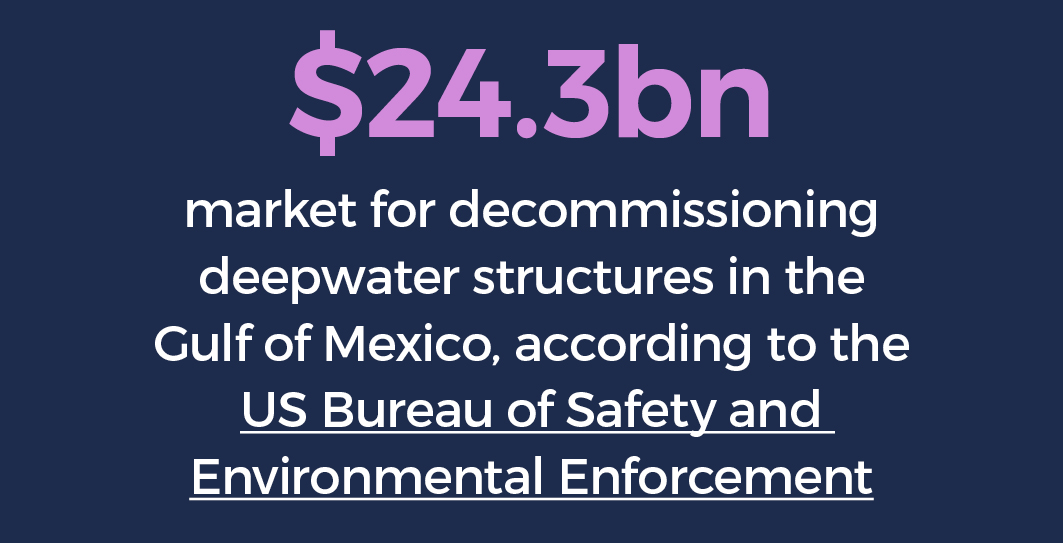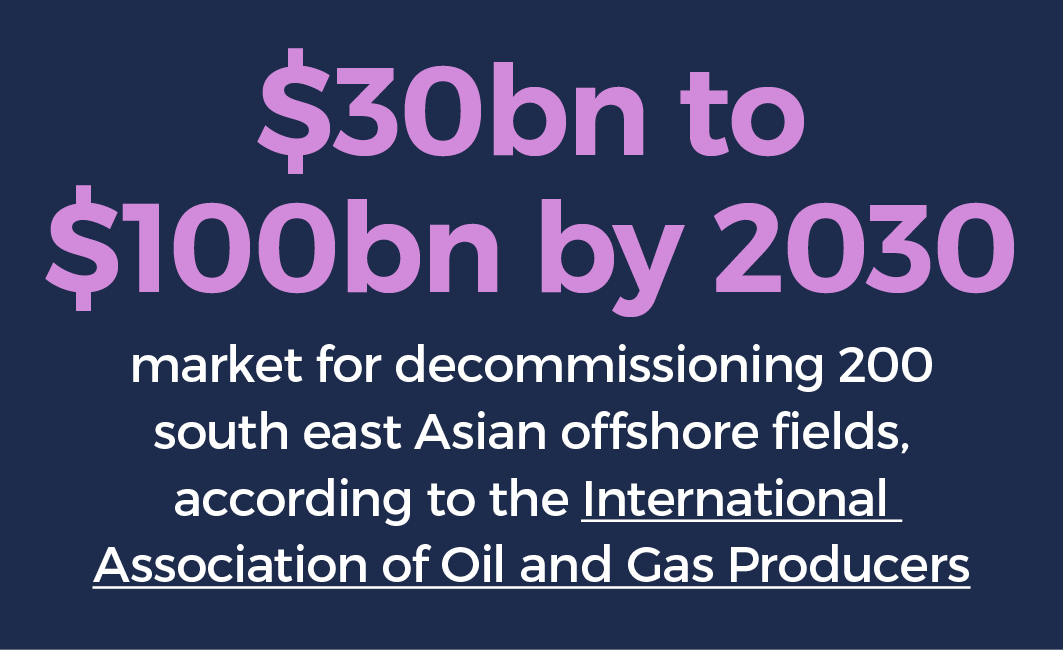International arbitration in 2024
Construction and environmental disputes from oil and gas decommissioning
By: Kate Gough, Matei Purice, Sarah-Jane Fick
IN BRIEF
As oil and gas assets reach the end of their lifecycles and the energy transition continues apace, a wave of decommissioning-related disputes seems inevitable, testing substantive issues of construction and environmental law, as well as existing dispute resolution mechanisms in standard forms of contracts.
Governments are under scrutiny to achieve net zero commitments. Despite initiatives seeking to decarbonize oil and gas activities (such as the Oil and Gas Decarbonization Charter), an international commitment to “phase down” global oil, gas and coal use was agreed at COP28.
Aside from some investment shifting from fossil fuels to renewable energy sources, a deluge of oil and gas wellheads, rigs, pipelines and processing plants are due to reach the end of their lifecycle within the next decade. A significant number of oil and gas assets will require decommissioning. The emerging decommissioning industry is set to boom.

Oil and gas decommissioning legal framework
Decommissioning poses complex environmental, legal, financial, social and logistical challenges. Decommissioning obligations can be found in specific contractual arrangements (including through PSCs, JOAs, concession agreements or similar arrangements), national laws and international conventions.
Older contracts often do not address decommissioning explicitly, albeit decommissioning activities may be impacted indirectly through environmental obligations, stabilization clauses or choice-of-law clauses. More recently, however, in an effort to standardize contractual arrangements for decommissioning activities, two standard forms of contract have been developed by the industry, namely the LOGIC General Conditions of Contract for Offshore Decommissioning (LOGIC Form) and the BIMCO DISMANTLECON Dismantling, Removal and Marine Services Agreement (BIMCO Form).
On a national level, countries coastal to the North Sea, the Gulf of Mexico and many in the Pacific Rim have developed detailed regimes for decommissioning oil and gas assets, usually overseen by national regulators, some authorized to impose hefty fines for non-compliance. Many of these regimes involve onerous liability and funding requirements. For instance, in Australia, historic owners of assets may retain liability for decommissioning long after they have passed on their interest. In New Zealand, all asset licensors are required to contribute to a sinking fund so that the costs of decommissioning are ring-fenced throughout an asset’s life cycle.
But many jurisdictions with sizable domestic oil and gas markets currently have limited (or no) legislation applicable to decommissioning activities. For example, neither Qatar nor the United Arab Emirates have specific legislation addressing the allocation of risk for decommissioning. We expect this will change in the coming decade as greater national legislation is adopted, either specifically targeting how decommissioning is to be carried out or in relation to environmental protections more generally.
Internationally, there is currently no overarching regulatory regime on decommissioning oil and gas assets, other than for installations located offshore: Article 60(3) of the 1982 UN Convention on the Law of the Sea provides that structures that are abandoned or disused within a signatory State’s exclusive economic zone (i.e., within 200 nautical miles beyond a State’s territorial sea) should be removed for the sake of safe navigation, and the International Maritime Organization has issued non-binding guidelines on the removal of offshore installations.
Some regional seas conventions may also impact the execution of decommissioning works, mostly focused on the movement of hazardous waste and general environmental protections (e.g., the 1978 Kuwait Regional Convention for Co-operation on the Protection of the Marine Environment from Pollution, the 1987 Convention for the Protection of Natural Resources and Environment of the South Pacific Region, or the 1995 Convention for the Protection of the Marine Environment and the Coastal Region of the Mediterranean).
Rising decommissioning disputes
Decommissioning projects are fraught with risk. Not only is every asset unique, but many oil and gas assets are in places that are remote or dangerous for workers. The execution of decommissioning oil and gas facilities can give rise to the classic construction legal risks: delays, cost overruns, skills scarcity, health and safety, etc.

As decommissioning work increases, skills shortages and a crunch across the value chain for decommissioning services and products is inevitable. Delay is therefore likely to be a hallmark feature of disputes concerning the execution of decommissioning work.
Sarah-Jane Fick
Freshfields Senior Associate
Increased public scrutiny of environmental breaches and fast-evolving environmental protection regimes means environmental compliance issues will likely be another key feature of near-term decommissioning disputes. Indeed, changes to the regulatory regimes are likely to impose new (and more onerous) environmental obligations that impact existing decommissioning obligations. In some circumstances, international law may provide protection from retroactive legislation under bilateral or multilateral investment treaties.
To add a further layer of complexity, the quality of the decommissioning work itself (whether covering a wellhead or dismantling infrastructure) is usually assessed against environmental criteria. Environmental breaches can trigger reporting obligations to a national regulator, public scrutiny and even, in some jurisdictions, personal accountability for corporate directors.
The potential for reputational damage to decommissioning project stakeholders is much higher than in a usual construction context. Additionally, commercial solutions are developing to maximize the repurposing of spent asset materials and parts. Requirements for the preservation of materials and parts adds further pressure on the quality delivery of decommissioning work. All these factors typically increase the risk of disputes.
Arbitration and decommissioning disputes
Given the sheer volume of decommissioning work necessary in the coming decade, we anticipate that companies will likely be confronted with the prospect of associated disputes including disputes among business partners on issues of responsibility for meeting those decommissioning requirements; disputes with contractors retained to implement decommissioning plans; and disagreements with governments on the scope and implementation of decommissioning requirements.
Decommissioning-related disputes have been determined either through arbitration (for instance, where issues have arisen out of legal instruments containing an arbitration clause) or local court proceedings (particularly where issues have arisen from domestic regulatory regimes). We expect this to remain the case. Both the LOGIC Form and the BIMCO Form provide for arbitration as the final dispute resolution mechanism (albeit the LOGIC Form, designed for use in the UK North Sea, provides for litigation as an alternative option).

Disputes will play out in a variety of fora arising out of a web of contractual arrangements with multi-tiered dispute resolution provisions and complex interplay between contractual obligations, national regulations and international undertakings by host States.
Matei Purice
Freshfields Counsel, Head of Global Projects Disputes Continental Europe
In the longer term, decommissioning disputes are unlikely to abate with the transition to renewable energy. Green energy infrastructure has a natural lifespan much like fossil fuel assets: the industry standard asset life of a wind turbine is estimated at 20-25 years, solar farms 30-40 years and a hydropower plant at 50-100 years. As a significant number of such assets near the end of their asset life, more disputes about decommissioning green energy assets are expected.
Energy project stakeholders should stay abreast of regulatory developments impacting local decommissioning requirements, allocation of liability and environmental liability trends generally. To mitigate against exposure to liability, parties involved in decommissioning projects should consider:
- adopting a standard form of contract developed in the industry for decommissioning projects;
- tailoring dispute resolution mechanisms to suit the specifics of particular decommissioning projects;
- structuring their participation in decommissioning projects to benefit from international law protection under international investment protection treaties; and
- ensuring appropriate insurance is in place.

Oil and gas disputes are likely to be only the first chapter in an energy decommissioning saga that may last for decades.
Kate Gough
Freshfields Partner
Top trends 2024
- Introduction
- Generative AI: opportunities and risks in arbitration
- Arbitration in times of crisis: conflict, sanctions, climate
- Energy transition: critical minerals industry challenges
- Arbitration Act 1996 reforms: ensuring London remains a leading seat for international arbitration
- EU campaign to end intra-EU investor-State arbitration: pushing investor creativity
- India: a new era for international arbitration?
- The evolving landscape of arbitrator conflicts and disclosure requirements
- Construction and environmental disputes from oil and gas decommissioning
- Public international law’s growing relevance for businesses
- Clarity or confusion? The implications of domestic court rulings for arbitration
- Is your life sciences contract susceptible to renegotiation or termination if the economics of the deal changes?
- Arbitration top trends archive
Our team
-

Kate Gough Partner
London
-

Matei Purice Counsel, Head of Global Projects Disputes Continental Europe
Paris, Dubai
-

Sarah-Jane Fick Principal Associate
Dubai, Singapur

